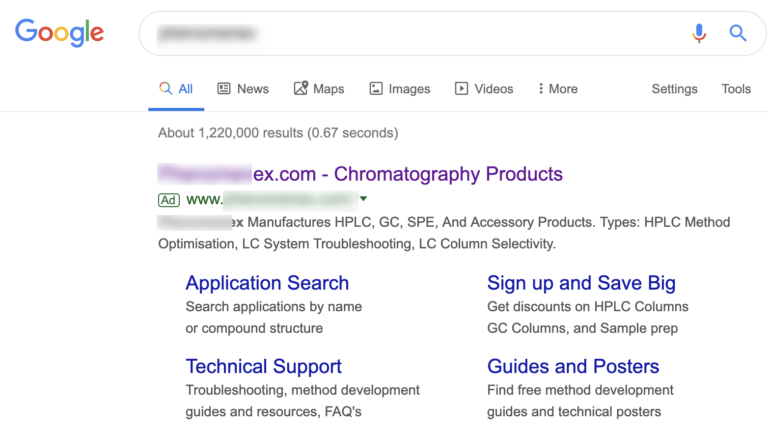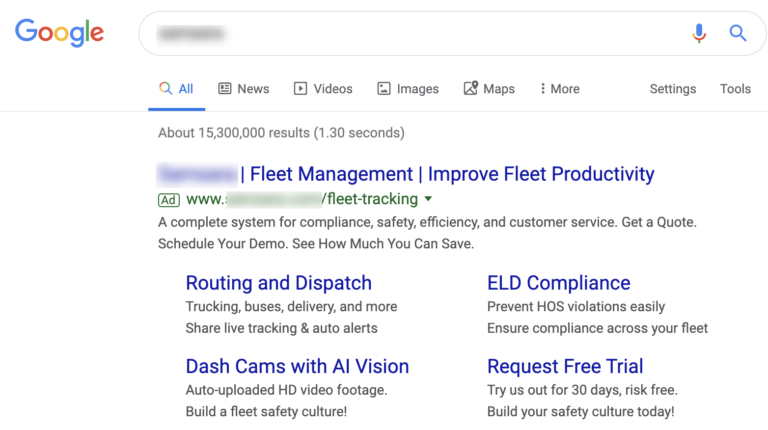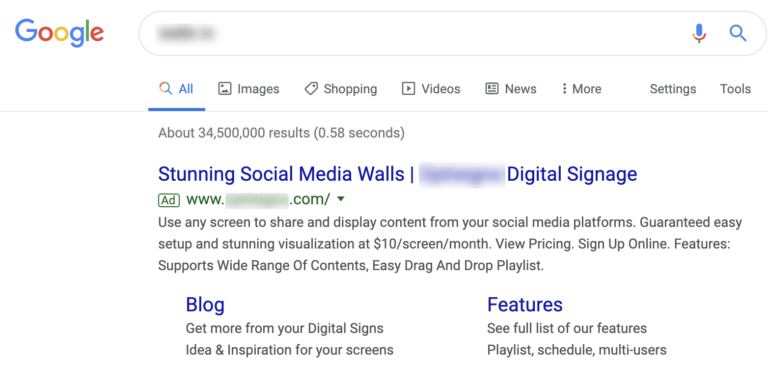07 Oct What You Should (& Should Not) Do with Your Sitelinks via @GrpTwentySeven
Of the many functions available to us in Google Ads, one of my favorites is sitelinks.
Sitelinks are fantastic because they’re so effective and versatile.
Whether you want to promote low search volume themes, push lagging products out the door, maximize hot sellers, highlight certain product categories, answer common questions, or handle a PR problem – sitelinks can do it all.
But lately, I’ve been seeing more and more instances where advertisers are using sitelinks incorrectly – and they’re missing valuable opportunities.
Sitelink Rules
If you want to get the most out of your sitelinks, you need to think carefully.
To help you with that, I’m going to lay out a few sitelink “rules.”
1. Get Clear on Your Objectives
Before you start, you need to think about your goals.
- What are you trying to achieve with this ad?
- Are you advertising products or services?
- Will the ad display as the result of a search on branded or non-branded keywords?
Your answers to these questions will help determine which types of sitelinks you should use.
2. Use Sitelinks as Part of Your Larger Strategy
Don’t think of your sitelinks in isolation.
You should also consider the accompanying ad, landing page, and other extensions.
Make sure they all work together in service to your overarching strategy.
3. Use a Mix of Sitelinks
Sitelinks can serve multiple purposes, so make sure you’re using a variety.
For example, you don’t want to use every sitelink on an ad to promote on-sale products. Instead, use a mix.
One could promote an on-sale product, one could generate leads, one could highlight a new product category and one could direct prospective clients to useful information.
4. Create Landing Pages for Your Sitelinks
Ideally, you want to send users to landing pages that tightly correlate with your sitelink instead of just a regular page on your website.
5. Track Sitelink Performance & Adjust
It isn’t enough to set up sitelinks.
You should also track them to see which links are getting traction and which ones are not.
This doesn’t mean that all sitelinks should perform equally (more on this below), but it does mean they should perform well given their type and objectives. You can do this through Google Analytics.
Sitelink Mix & Performance
Let’s dive deeper into this idea of using a mix of sitelinks by looking at a Google Analytics sitelink report.
In this account, we created four different types of sitelinks:


- SL_Today is for today’s on-sale items. We often use sitelinks to advertise sales or discounts.
- SL_Account gives visitors the option of creating an account. For some clients, this isn’t a huge revenue producer, but it’s doing fairly well here.
- SL_View is another sales/promotional sitelink.
- SL_Product name is used to promote a specific product. (I’ve removed the actual product name for privacy reasons.)
As you can see, the results we’re getting for each sitelink varies widely, and that’s OK.
The idea is to offer options to visitors. If they aren’t interested in a particular sale item, maybe you can catch their interest with something else.
In other words, not all sitelinks have to be (or should be) for sales or promotions. You can also use them to support, enhance, and complement what you’re doing.
A Few Sitelink Examples
I mentioned above that I’ve been seeing some not-great usage of sitelinks.
Let’s look at some examples to see what’s being done well, and where there’s room for improvement.
Example 1: Chromatography


Let’s take a closer look at each of the above sitelinks.
- Application Search: This ad for a highly technical product that can be used in a wide variety of applications. (Chromatography is a laboratory technique for separating mixtures.) So putting “application search” in a sitelink here might make sense. It helps prospective clients find what they’re looking for.
- Sign up and Save Big: A good sitelink for lead generation and potential revenue.
- Technical Support: I’m not a big fan of putting technical support in sitelinks. Tech support seems more targeted to current users rather than prospective users. But who knows, maybe they really do want to help current users get tech support via their advertising.
- Guides and Posters: Again, this sitelink is a bit unusual, but it might be appropriate for this product. Perhaps people are downloading branded posters and posting them in their workplace. If so, it’s a great way to build brand awareness.
Example 2: Fleet Management


- Routing and Dispatch: This sitelink covers specific tools for fleet management. Looks good.
- ELD Compliance: ELD compliance is important in this industry. This sitelink works as a soft sell and answers a question.
- Dash Cams with AI Vision: This sitelink promotes one of their products.
- Request a Free Trial: Free trial offers are perfect for sitelinks. It’s a great way to generate leads.
Example 3: Digital Signage


- Blog: I’m not a big fan of this sitelink. Surely with a bit of thought and strategy they could use this sitelink for something else? They have “sign up online” in their body of the ad. Perhaps that would be a better choice to generate some leads? If they really wanted to stay with “blog” as a sitelink, at a minimum they should link to their best performing blog post, not just the category of “blog.”
- Features: Again, I’m not too excited about this one. It’s okay to use sitelinks to take people to your features page, but they need more descriptive content to make it appealing. There are some missed opportunities here!
Get the Most Out of Your Sitelinks
Many advertisers are careful to craft a mix of sitelinks that are strategic and serve a defined goal.
But sometimes sitelinks are added as an afterthought.
Which is too bad. Because when deployed correctly, sitelinks can do a lot to improve performance and brand awareness.
More Resources:
- Everything You Need to Know About Ad Extensions
- 7 Out-of-the-Box PPC Advertising Ideas You Should Try Now
- PPC 101: A Complete Guide to PPC Marketing Basics
Image Credits
Featured image: Dreamstime.com
All screenshots taken by author, September 2019
Sorry, the comment form is closed at this time.